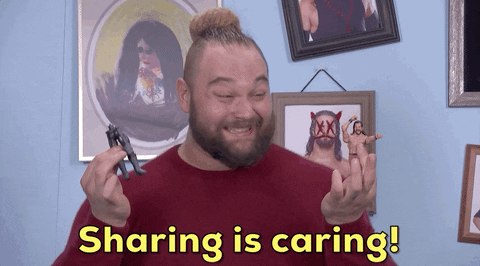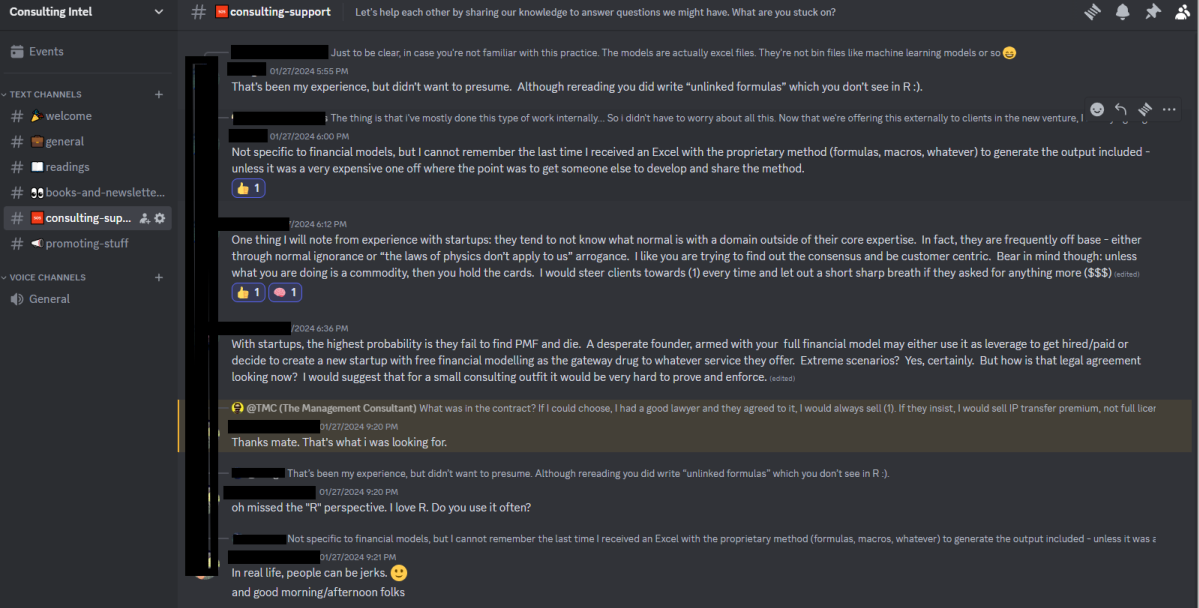Sushi, nicknames, and office bonds: the unlikely recipe for team cohesion
How a sushi mishap turned into a little leadership tool
Hello to the 1,243 subscribers who read Consulting Intel! I recently switched to a different newsletter format: read the whole thing! There’s a new section in here!
Laughter is healing.
I feel shared laughter is one of the most humane acts anyone can participate in.
For it is those little jokes that we often overlook, but can only be understood by our close-knit group, that make a place a home - even if it’s a workplace.
Think about it.
We spend a large portion of our life in the office, with strangers who have no obligation to give a damn about us. Going through corporate hardships and complex clients, or even more complex bosses, can be a bonding experience strengthened by funny moments shared together.
When we laugh together, it does more than just lighten the mood. It makes us feel like we belong, that we are safe to be ourselves, even with our little oddities.
I’m no Huberman here, and chemistry was one of the few subjects that I fuckin’ hated at school, but I can speak from experience: a smile, a chuckle, or a loud cackle are all nature’s stress-busters.
Not pranks though, I hate pranks.
Workplaces are no place for pranks, no matter what sitcoms try to tell you (well, unless your boss is Michael Scott and, in my experience with consulting, that’s seldom the case.)
Let me share a story to illustrate the point I am trying to make.
While I was working in the Netherlands, my team had this tradition of eating sushi a few times a week. Booking a table over the phone was always a big challenge because my weird Italian name confused the all Japanese staff at the restaurant.
After a few rounds of spelling my name and spending 10 minutes each instance to book a f- table at the local sushi restaurant, I was convinced I had to come up with some creative way of handling this…
So, I decided to keep it simple and gave my name as “Johnny”.
Yes, my name became Johnny, and it was a hit!
Suddenly, booking was quick.
No more questions such as “Can you spell it please?” or “Can you say that again?”
My team found it hilarious when they discovered my new alias and even our clients got in on the act, calling me Johnny around the office.
I guess something about the name being from an English nursery rhyme everyone knew, amused and gave a sense of childish familiarity to my international team.
Very quickly, I was Johnny for everybody in the Netherlands.
This “Johnny” thing turned into mine and my team’s little inside joke.
The nickname even followed me to Starbucks and pizza places.
To this day, I am still Johnny to many restaurateurs and coffee shop owners around the world.
PS: This week’s edition is brought to you by:
We provide financial services business with full stack marketing solutions.
Reach your prospects with compelling, compliant marketing.
Sharing a light moment can transform work life.
A team that can laugh together is more connected, resilient, and simply happier.
Now, you might think that having everyone, including clients, call me “Johnny” because of a sushi booking mishap could undermine my authority or professionalism.
Instead, it did the opposite!
This inside joke made me more approachable. It showcased my ability to laugh at myself. It turned a potential point of embarrassment into a source of unity and strength.
It is a common misconception that leaders need to maintain a stern, unyielding façade to command respect.
Yet, my “Johnny” experience highlights how showing your human side, including your quirks and the occasional slip-up, can deepen respect and build a more genuine, trusting team environment.
In embracing the humor of the situation, I inadvertently taught my team something.
Perfection is not relatable. It is our shared imperfections that truly connect us.
Next time you find yourself in a seemingly awkward situation, consider leaning into it with a bit of humor. You might be surprised at its positive impact on your relationships and leadership.
Embracing your vulnerabilities can strengthen your team dynamics.
Do not underestimate the power of a shared giggle or an inside joke.
It is precisely these moments of joy and camaraderie that make our work life so much richer.
✍ The Management Consultant
PS: If you like this newsletter, I have one huge favor to ask.
Please spread the word. Share it with your friends and your colleagues. Ask them to subscribe.
This is the most effective way to support me (…and to keep me motivated to continue writing 😁).
Thank you!
❓ F.A.Q.
Every week, I will choose a question I received from readers and answer it in this section. All anonymous (I won’t mention you unless you ask me to)! Drop your questions here!
This is an interesting question. I ended up in this situation hundreds of times!
Think about adding a personal touch that goes beyond the usual “great to meet you” email. Maybe you picked up on a detail during your chat, like their favorite soccer team or a recent vacation they mentioned. Starting off with a little nod to that can grab their attention and show you were listening.
If you can, I prefer SMS to email because, especially if these are senior people, emails get crowded very easily. It’s hard to stand out.
Another cool approach is to share something useful with them. It could be an article, some pdf, or a tool that ties into what they do. It’s a nice way to make your follow-up feel more personal and less transactional.
You can also warm things up by connecting on social media first. Like or comment on one of their posts on LinkedIn (or 𝕏). It's a subtle way to get on their radar before you even send your follow-up email.
For something really memorable, consider sending a handwritten note. It's old school, but imagine their surprise at getting something in the mail that's not a bill or an ad. If you shared a joke or a moment, throw in a little something related to that. It is a charming touch.
Also, maybe you can suggest a small project you could do together? Propose something that you both could benefit from. It shows that you are serious about turning this connection into a real opportunity for collaboration.🎯 INTERESTING SH*T
A few things I found on the internet that you may like…
Found this report from McKinsey on exploring opportunities in the generative AI value chain. It’s a few months old, but totally applicable. Have a read.
A 4-minute compendium from Jordan Peterson. Watch it (doesn’t matter what you think of the man…).
“It’s much more informative to walk away from a conversation having learned something that you didn’t know, than it is having won the stupid argument which you can’t win anyways”
One of my favorite reads is The Random Recruiter. Check out his newsletter on How to attract a mentor.
🤟 LET’S GET CLOSER
Do you have any feedback or any idea you would like to run past me?
I would greatly appreciate it if you could spend 90 seconds of your time filling this Google Form.
Everything you send me will be confidential and I will respond!
🚨 SPONSORSHIP
Consulting Intel is read by more than 1,200 consultants globally.
The readers include management consultants from McKinsey, BCG, Bain, Deloitte, EY, EY-Parthenon, KPMG, PwC, Accenture, Oliver Wyman, PA Consulting, and various boutique consultancies worldwide.
Many corporate employees and independent consultants are regular readers of Consulting Intel.
If you think your products or services could resonate with this audience, get in touch!
PS: Can’t believe I’m saying this, but slots are filling fast! Get in touch.
👀 JOIN THE DISCORD SERVER
If you like this newsletter, you will love our Discord Server.
In there, you will find a tight-knit community of more than 60 management consultants from all over the world discussing real-life challenges, giving each other support and recommending the good stuff to keep our knowledge top notch.









